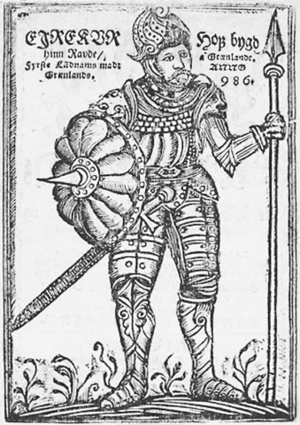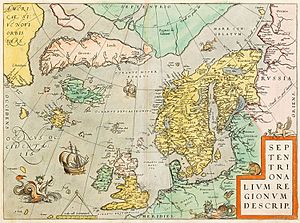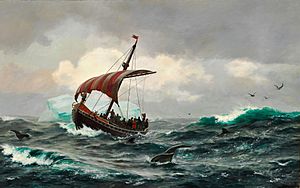Erik the Red facts for kids
Quick facts for kids
Erik the Red
|
|
|---|---|

Erik the Red from Arngrímur Jónsson's Grönlandia. Note anachronistic details in his weapons and armor.
|
|
| Born | c. 950 Jæren, Norway
|
| Died | c. 1003 (aged around 53) |
| Nationality | Norse |
| Occupation | Settler, explorer |
| Known for | Founded the first Norse settlement in Greenland |
| Partner(s) | Þjódhild Jorundsdottir |
| Children | Freydís, Leif Erikson, Thorvald and Thorstein |
| Parent(s) | Thorvald Asvaldsson (father) |
Erik Thorvaldsson (c. 950 – c. 1003), known as Erik the Red, was a famous Norse explorer. He is known for starting the first European settlement in Greenland. People believe he was called "the Red" because of his red hair and beard. Erik was born in Norway. His son, Leif Erikson, also became a well-known explorer.
Contents
Erik the Red: A Viking Explorer
Early Life and Family
Erik Thorvaldsson was born in Rogaland, Norway, around the year 950 CE. His father was Thorvald Asvaldson. When Erik was about 10 years old, his family moved from Norway to Iceland. They settled in a place called Hornstrandir in northwestern Iceland.
Erik married a woman named Þjódhild Jorundsdottir. They moved to Haukadalr, where Erik built a farm called Eiríksstaðir. Erik and Þjódhild had four children: a daughter named Freydís, and three sons named Leif Erikson, Thorvald, and Thorstein. While his wife and son Leif became Christians, Erik chose to follow the old Norse paganism beliefs.
Life in Exile
Like his father, Erik also faced banishment from his home. This happened after some conflicts with neighbors. Because of these problems, Erik was sentenced to leave Iceland for three years around the year 982.
During his exile, Erik decided to explore new lands. He sailed west to find a place where he could start fresh.
Discovering Greenland
Before Erik, other Norsemen had seen Greenland, but Erik was the first to start a lasting European settlement there. He sailed around the southern tip of the island, known as Cape Farewell. Then, he explored the western coast. He found a part of the coast that was mostly free of ice. This area seemed good for farming, much like Iceland.
Erik spent his three years of exile exploring this new land. He named it "Greenland" to make it sound more attractive to potential settlers. He believed that a good name would encourage people to move there. He was right! Many people, especially those struggling on poor land in Iceland, were excited by the idea of new opportunities in Greenland.
Building Settlements
After his exile ended, Erik returned to Iceland to gather colonists. In 985, he set sail for Greenland with a large group of people. Out of 25 ships, only 14 made it across the ocean. The others were lost at sea.
The settlers established two main colonies on the southwest coast of Greenland. These were the Eastern Settlement (Eystribyggð) near what is now Qaqortoq, and the Western Settlement near modern-day Nuuk. These areas were the best for farming. During the warmer summers, people from the settlements would travel north to Disko Bay. There, they would hunt for food and valuable items like seals and walrus tusks.
Eastern Settlement
In the Eastern Settlement, Erik built his home, called Brattahlíð, close to present-day Narsarsuaq. He became the main leader of Greenland and was very respected and wealthy.
The settlement grew and thrived, with about 5,000 people living there. More immigrants came from Iceland, looking for new homes. However, in 1002, a sickness spread through the colony. Many people died, including Erik the Red himself, around the year 1003.
Even after Erik's death, the colony continued for a long time. It survived until the 15th century, when the climate became much colder during the Little Ice Age. This made it very hard for the European way of life to continue in Greenland. Other reasons for its decline included conflicts with the Inuit people and less support from Norway.
Erik's Death
Erik's son, Leif Erikson, became the first Viking to explore a part of North America called Vinland. Leif invited his father to join him on this voyage. However, a legend says that Erik fell off his horse on the way to the ship. He saw this as a bad sign and decided not to go. Leif continued the journey without him. Erik died in an epidemic that affected many colonists during the winter after his son left.
See also
 In Spanish: Erik el Rojo para niños
In Spanish: Erik el Rojo para niños
 | DeHart Hubbard |
 | Wilma Rudolph |
 | Jesse Owens |
 | Jackie Joyner-Kersee |
 | Major Taylor |



